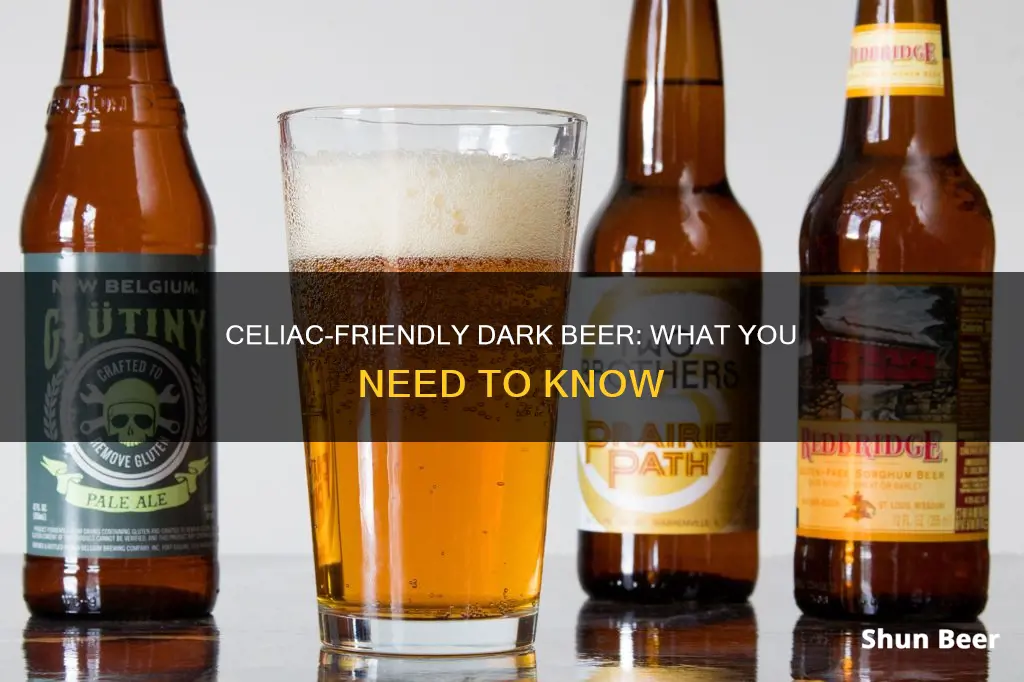
Celiac disease is an autoimmune disorder that affects around 1% of people worldwide. Those with the condition cannot consume gluten, a protein found in wheat, rye, and barley. Beer is traditionally made with barley, hops, yeast, and sometimes wheat, and therefore contains high levels of gluten. However, some people with celiac disease may be able to tolerate small amounts of gluten without experiencing adverse effects. There are also gluten-free beers available, which are made with alternative grains such as sorghum, quinoa, and buckwheat. These beers are generally safe for people with celiac disease, although they may have a slightly different taste and are often more expensive.
Can Celiacs Drink Dark Beer?
| Characteristics | Values |
|---|---|
| Beer gluten-free? | No, conventional beer is not gluten-free. |
| Beer ingredients | Beer is typically made from a combination of malted barley, hops, yeast, and sometimes wheat. |
| Gluten-free beer ingredients | Sorghum, quinoa, buckwheat, etc. |
| Gluten-removed beer | Beers that are "gluten-removed" are made with grains that have gluten, but the gluten is removed in production. However, some bits may remain, and it is not recommended for people with celiac disease. |
| Gluten-free beer taste | Gluten-free beers might be sweeter or less carbonated than regular beers. |
| Celiac disease and gluten | Celiac disease is an autoimmune disorder in which a person cannot digest gluten, a protein found in wheat, rye, and barley. |
| Celiac disease symptoms | Indigestion, diarrhea, iron-deficiency anemia, itchy skin rash (dermatitis herpetiformis), and damage to the intestinal lining. |
| Celiac disease treatment | The only treatment for celiac disease is to remove gluten from the diet. |
| Other gluten-free alcoholic drinks | Wine, pure distilled liquors, hard ciders (but check the ingredients), cognac, vermouth, etc. |
What You'll Learn

Beer is not gluten-free
The only treatment for celiac disease is to remove gluten from your diet. Therefore, a person suffering from celiac disease cannot drink normal beer. They can, however, drink gluten-free beer, which does not have anything that will cause an adverse reaction.
Gluten-free beers are made with grains that don't have any gluten, such as sorghum, quinoa, and buckwheat. These beers often cost more because the alternative grains and adaptations add to production costs. You may also find that gluten-free beers taste a bit different than regular beers. They might be sweeter or less carbonated.
Some beers are labelled as "gluten-removed". These are made with grains that naturally contain gluten, and the gluten is removed during production, but some fragments may remain. Experts recommend that people with celiac disease avoid gluten-removed beers.
By law, manufacturers can only label a beer gluten-free if it contains 20 parts per million (ppm) or less of gluten. This is the lowest amount of gluten that can be detected with available scientific tools. Celiac disease can be triggered by as little as 100 milligrams of gluten or 1/64 teaspoon of flour a day. In some people, just 10 milligrams of gluten can activate celiac disease.
One study found that several blood samples from people with celiac disease reacted to proteins in gluten-removed beer, indicating that it still had some fragments of gluten and may not be safe for people with celiac disease. However, none of the samples had reactions to gluten-free beer.
Other gluten-free alcoholic drinks
Other alcoholic drinks that are gluten-free include wine, pure distilled liquors, drinks made from fermented fruit juices, and hard ciders. However, some hard ciders may also contain barley, so it is important to read the ingredients list carefully.
Beer and Colonoscopy: What's the Safe Timeline?
You may want to see also

Gluten-free beers are made with grains that don't contain gluten
Celiac disease is an autoimmune disorder triggered by the ingestion of gluten, a mixture of individual proteins found in many grains. Barley and wheat are among the most common grains used in the beer-making process, and both contain gluten. Therefore, conventional beer is not gluten-free and is not suitable for those with celiac disease.
However, gluten-free beers are typically made with grains that do not contain gluten, such as millet, rice, sorghum, buckwheat, corn, or quinoa. These beers are regulated by the Food and Drug Administration (FDA) and must contain less than 20 parts per million (ppm) of gluten to be labelled as gluten-free. Some popular gluten-free beers include Buck Wild Pale Ale by Alpenglow Beer Company and Glutenberg Craft Brewery Blanche.
It is important to note that "gluten-removed" or "gluten-reduced" beers are not the same as gluten-free beers. These beers are made from gluten-containing grains and undergo a process intended to reduce their gluten content. However, the effectiveness of this process has not been scientifically validated, and gluten-removed beers are not recommended for those with severe gluten intolerance or celiac disease.
For those with celiac disease or gluten intolerance, it is crucial to read labels carefully and choose only gluten-free beers made with gluten-free grains. Additionally, distilled spirits are typically safe for those with celiac disease, as the distillation process removes gluten.
Marijuana and Beer: Mixing Effects and What You Should Know
You may want to see also

Gluten-removed beers may not be safe for people with celiac disease
Celiac disease is an autoimmune disorder that affects around two million people in the US and one percent of the global population. People with celiac disease cannot eat gluten, a protein found in wheat, rye, and barley, and must follow a gluten-free diet.
Beer typically contains gluten as it is made from a combination of malted barley, hops, and sometimes wheat, all of which contain gluten. Therefore, regular beer is not suitable for people with celiac disease.
However, there are gluten-removed beers on the market, which are made with gluten-containing grains but have undergone a process to remove the gluten. The safety of these gluten-removed beers for people with celiac disease has been questioned.
The current consensus is that gluten-removed beers are not yet safe for those with celiac disease. This is because the methods used to break down gluten proteins during production, such as hydrolysis, cannot be effectively tested for gluten content. In addition, studies have found that some people with celiac disease still experience an immune reaction to gluten-removed beers, indicating that these beverages may still contain harmful levels of gluten.
Therefore, while gluten-removed beers may be an appealing option for those with celiac disease, the current evidence suggests that they may not be safe. Experts recommend that people with celiac disease avoid gluten-removed beers and instead choose beers that are labelled as gluten-free. These beers are made with naturally gluten-free grains and are generally considered safe for consumption by those with celiac disease.
Drinking Beer in Public: Michigan's Law Simplified
You may want to see also

Wine, pure distilled liquors, and hard ciders are gluten-free
People with celiac disease must avoid consuming gluten, a mixture of proteins found in grains such as wheat, barley, and rye. Gluten is present in beer, which is made from barley, and can trigger an autoimmune response in people with celiac disease. However, some gluten-free alternatives, such as hard cider, pure distilled liquors, and wine, are suitable for those with celiac disease.
Hard cider is a gluten-free beverage that is typically made from apples. Various brands offer gluten-free hard ciders with different flavours and aromas, such as Strongbow Gold Apple, Woodchuck Hard Cider, and Angry Orchard Hard Cider. These ciders can be paired with a variety of dishes, including seafood, spicy foods, chicken, and cheese.
Pure distilled liquors, even those made from gluten-containing grains like wheat, barley, or rye, are considered gluten-free. The distillation process effectively removes proteins, including gluten, from the final product. Most liquors are safe for people with celiac disease, although caution is advised for liquors with added flavourings or other additives introduced after distillation, as they may contain hidden gluten. Examples of distilled liquors that are generally gluten-free include whiskey, scotch, vodka, and gin.
Wine is typically made from fermented grapes, which are naturally gluten-free. While there is a possibility of gluten cross-contact during the winemaking process, it is generally considered safe for people with celiac disease. Most wines are unlikely to contain gluten, and wine companies are increasingly seeking third-party gluten-free certification to provide added assurance to consumers. However, wine coolers and flavoured wines may contain gluten, especially if they are made with a malt base derived from barley. Therefore, it is important to check the ingredients and look for "gluten-free" labels or certifications when choosing a wine.
Can a Human Drink 100 Beers in 24 Hours?
You may want to see also

There are gluten-free options for celiacs who want to drink beer
Celiacs cannot drink conventional beer as it is typically made from a combination of malted barley, hops, and sometimes wheat—all of which contain gluten. However, there are gluten-free options for celiacs who want to drink beer.
The Food and Drug Administration (FDA) states that a product can be labelled gluten-free if it has a gluten content of less than 20 parts per million (ppm). This is because the available scientific tools can only detect gluten at levels above 20ppm, and this amount is considered safe for people with celiac disease.
There are two types of gluten-free beer: naturally gluten-free beer and gluten-removed gluten-free beer. Naturally gluten-free beers are made from gluten-free grains such as sorghum, quinoa, and buckwheat. These beers are generally safe for people with celiac disease, although they may taste slightly different from regular beers. Gluten-removed beers, on the other hand, are made from grains that naturally contain gluten, and the gluten is removed during production. However, some fragments of gluten may remain, and experts recommend that people with celiac disease avoid these beers.
In addition to gluten-free beer, there are other alcoholic drinks that are safe for celiacs to consume. These include wine, pure distilled liquors, and hard ciders made from fermented fruit juices. However, it is important to read labels carefully, as some ciders may contain barley, and distilled liquors may have gluten-containing ingredients added after distillation.
Beer and Vitamins: What's the Deal?
You may want to see also
Frequently asked questions
No, people with celiac disease cannot drink regular beer. Beer is usually made from barley or wheat, which contain gluten. However, they can drink gluten-free beer.
If a person with celiac disease consumes gluten, it can flatten the villi in their small intestine and damage the intestinal lining. This can lead to nutrient deficiencies, causing anaemia, osteoporosis, pancreatic insufficiency, gall bladder malfunction, intestinal lymphoma, and certain neurological diseases.
Celiacs can safely consume alcoholic drinks that are naturally gluten-free, such as wine, pure distilled liquors, hard seltzers, and drinks made from fermented fruit juices. There are also specially manufactured gluten-free beers available, which are made without gluten-containing grains.
By law, a beer can only be labelled as gluten-free if it contains 20 ppm (parts per million) or less of gluten. However, it's important to note that gluten-removed beers may still contain traces of gluten and are not considered safe for people with celiac disease.
While alcohol can be a part of a gluten-conscious lifestyle, it's important to drink in moderation. Excessive alcohol consumption may increase gluten sensitivity in individuals who are genetically susceptible. Additionally, cross-contamination during the manufacturing process or the presence of tiny gluten fragments in distilled liquors made from gluten-containing ingredients may cause unpleasant side effects for some people with celiac disease.







